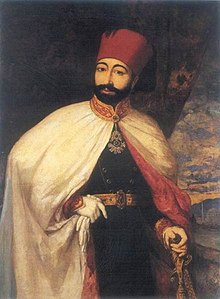Mahmut II
| Mahmud II محمود ثانى |
|||||
|---|---|---|---|---|---|
| Caliph of Islam Amir al-Mu'minin Sultan of the Ottoman Empire Kayser-i Rûm Custodian of the Two Holy Mosques |
|||||
 |
|||||
| 30th Ottoman Sultan (Emperor) | |||||
| Reign | 28 July 1808 – 1 July 1839 | ||||
| Predecessor | Mustafa IV | ||||
| Successor | Abdülmecid I | ||||
| Born | 20 July 1784 Topkapı Palace, Constantinople, Ottoman Empire |
||||
| Died | 1 July 1839 (aged 54) | ||||
| Consorts | Ebrureftar Kadın Nevfidan Kadın Hoşyar Kadın Kameri Kadın Aşubcan Kadın Nurtab Kadın Mislinayab Kadın Bezmiâlem Sultan Pervizifelek Kadın Zernigar Hanım Hüsnimelek Hanım Pertevniyal Sultan Tiryal Hanım Lebrizifelek Hanım |
||||
|
|||||
| Dynasty | House of Osman | ||||
| Father | Abdul Hamid I | ||||
| Mother | Nakşidil Sultan | ||||
| Tughra |  |
||||
| Full name | |
|---|---|
| Mahmud bin Abdul Hamid |
Mahmud II (Ottoman Turkish: محمود ثانى Mahmud-u sānī, محمود عدلى Mahmud-u Âdlî) (Turkish: II. Mahmud) (20 July 1785 – 1 July 1839) was the 30th Sultan of the Ottoman Empire from 1808 until his death in 1839. He was born in the Topkapı Palace, Constantinople, the posthumous son of Sultan Abdul Hamid I.
His reign is recognized for the extensive administrative, military, and fiscal reforms he instituted, which culminated into the Decree of Tanzimat ("Reorganization") that was carried out by his sons Abdülmecid I and Abdülaziz I. Often described as "Peter the Great of Turkey", Mahmud's reforms included the 1826 abolition of the conservative Janissary corps, which removed a major obstacle to his and his successors' reforms in the Empire.
His mother was Nakşidil Valide Sultan (who according to legend was a cousin of Joséphine de Beauharnais, wife of Napoleon Bonaparte). In 1808, Mahmud II's predecessor, and half-brother, Mustafa IV ordered his execution along with his cousin, the deposed Sultan Selim III, in order to defuse the rebellion. Selim III was killed, but Mahmud was safely kept hidden by his mother and was placed on the throne after the rebels deposed Mustafa IV. The leader of this rebellion, Alemdar Mustafa Pasha, later became Mahmud II's vizier. Western Historians give Mahmud a bad reputation for simply being the Sultan during a time of deterioration of the Ottoman Empire.
...
Wikipedia
